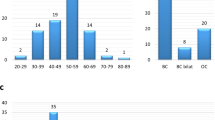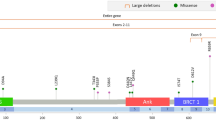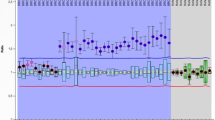Abstract
The BRCA1 gene on chromosome 17q21 is responsible for an autosomal dominant syndrome of increased susceptibility to breast and ovarian cancer but no somatic mutations in tumours have yet been described. To study the potential role of BRCA1 in sporadic carcinogenesis, we analysed the genomic DNA of tumour and normal fractions of 47 ovarian cancers for mutations in BRCA1 using the single–strand conformation polymorphism technique. We now describe somatic mutations in the DNA of four tumours which also had loss of heterozygosity (LOH) at a BRCA1 intragenic marker. Our data support a tumour suppressor mechanism for BRCA1; somatic mutations and LOH may result in inactivation of BRCA1 in at least a small number of ovarian cancers.
This is a preview of subscription content, access via your institution
Access options
Subscribe to this journal
Receive 12 print issues and online access
$209.00 per year
only $17.42 per issue
Buy this article
- Purchase on Springer Link
- Instant access to full article PDF
Prices may be subject to local taxes which are calculated during checkout
Similar content being viewed by others
References
Miki, Y. et al. A strong candidate for the breast and ovarian cancer susceptibility gene BRCA1. Science 266, 66–71 (1994).
Futreal, P.A. et al. BRCA1 mutations on primary breast and ovarian carcinomas. Science 266, 120–122 (1994).
Hall, J.M. et al. Linkage of early onset breast cancer to chromosome 17q21. Science 250, 1684–1689 (1990).
Castilla, L.H. et al. Mutations in the BRCA1 gene in families with early-onset breast and ovarian cancer. Nature Genet. 8, 387–391 (1994).
Simard, J. et al. Common origins of BRCA1 mutations in Canadian breast and ovarian cancer families. Nature Genet. 8, 392–398 (1994).
Friedman, L.S. et al. Confirmation of BRCA1 by analysis of germline mutations linked to breast and ovarian cancer In 10 families. Nature Genet. 8, 399–404 (1994).
Shattuck-Eidens, D. et al. A collaborative survey of 80 mutations in the BRCA1 breast and ovarian cancer susceptibility gene. J. Am. med. Assoc. 273, 535–541 (1995).
Easton, D.F., Bishop, D.T., Ford, D. & Crockford, G.P. The Breast Cancer Linkage Consortium. Genetic linkage analysis in familial breast and ovarian cancer. Results from 214 families. Am. J. hum. Genet. 52, 678–701 (1993).
Ford, D. et al. Risks of cancer in BRCA1 mutation carriers. Lancet 343, 692–695 (1994).
Kelsell, D.P., Black, D.M., Bishop, D.T. & Spurr, N.K. Genetic analysis of the BRCA1 region in a large breast/ovarian family: Refinement of the minimal region containing BRCA1. Hum. molec. Genet. 2, 1823–1828 (1993).
Smith, S.A., Easton, D.F., Evans, D.G.R. & Ponder, B.A.J. Allele losses in the region 17q12–21 in familial breast and ovarian cancer involve the wild-type chromosome. Nature Genet. 2, 128–131 (1992).
Sato, T. et al. Allelotype of human ovarian cancer. Cancer Res. 51, 5118–5122 (1991).
Lee, J.H., Kavanagh, J.J., Wildrick, D.M., Wharton, J.T. & Blick, M. Frequent loss of heterozygosity on chromosomes 6q, 11, and 17 in human ovarian carcinomas. Cancer Res. 50, 2724–2728 (1990).
Eccles, D.M., Cranston, G., Steel, C.M., Nakamura, Y. & Leonard, R.C.F. Allele losses on chromosome 17 in human epithelial ovarian carcinomas. Oncogene 5, 1599–1601 (1990).
Jacobs, I.J. et al. A deletion unit on chromosome 17q in epithelial ovarian tumors distal to the familial breast/ovarian cancer locus. Cancer Res. 53, 1218–1221 (1993).
Cropp, C.S. et al. Evidence for involvement of BRCA1 in sporadic breast carcinomas. Cancer Res. 55, 2548–2551 (1994).
Merajver, S.D. et al. Germline BRCA1 mutations and loss of the wild-type allele in early-onset breast/ovarian families. Clin. Cancer Res. (in the press).
Young, R.H. & Scully, R.E. Pathology of epithelial tumors. Hem. /Onc. Clin. N. Am. 6, 739–760 (1992).
Orita, M., Suzuki, Y., Sekiya, T.S. & Hayashi, K. Rapid and sensitive detection of point mutations and DNA polymorphisms using the polymerase chain reaction. Genomics 5, 874–879 (1989).
Knudson, A.G. Antioncogenes and human cancer. Proc. natn. Acad. Sci. U.S.A. 90, 10914–10921 (1993).
Frank, T.S. et al. Loss of heterozygosity and overexpression of the p53 gene in ovarian carcinoma. Mod. Pathol. 7, 3–8 (1994).
Beaudet, A.L. & Tsui, L.-C. A suggested nomenclature for designating mutations. Hum. Mut. 2, 245–248 (1993).
Author information
Authors and Affiliations
Rights and permissions
About this article
Cite this article
Merajver, S., Pham, T., Caduff, R. et al. Somatic mutations in the BRCA1 gene in sporadic ovarian tumours. Nat Genet 9, 439–443 (1995). https://doi.org/10.1038/ng0495-439
Received:
Accepted:
Issue Date:
DOI: https://doi.org/10.1038/ng0495-439
This article is cited by
-
A reliable method for the detection of BRCA1 and BRCA2 mutations in fixed tumour tissue utilising multiplex PCR-based targeted next generation sequencing
BMC Clinical Pathology (2015)
-
A mutational signature in gastric cancer suggests therapeutic strategies
Nature Communications (2015)
-
Investigation of the hub genes and related mechanism in ovarian cancer via bioinformatics analysis
Journal of Ovarian Research (2013)
-
BRCA1/BRCA2 gene mutations/SNPs and BRCA1 haplotypes in early-onset breast cancer patients of Indian ethnicity
Medical Oncology (2012)
-
Regulation of IGF2 transcript and protein expression by altered methylation in breast cancer
Journal of Cancer Research and Clinical Oncology (2011)



